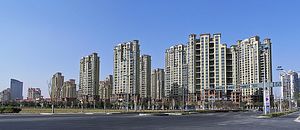Although the biggest news last week out of China was understandably the investigation of Zhou Yongkang, the Chinese Communist Party (CCP) added considerable detail to its plans to liberalize rural-urban migration in China. In the past, Chinese rural citizens wishing to seek greater fortunes in the country’s generally more prosperous cities had to either wait for a permit that would let them move to a city and use public resources or remain content to live as second-class citizens, without access to state-run social services. This state of affairs was largely due to China’s hukou permit system, which was the state’s attempt to make sure that urbanization and local government resources remained in sync.
Last week’s announcement demonstrates a key feature of the central government’s plans to reform the hukou system: it will be gradual. Under the newly announced reforms, Chinese cities will be classified into three classes–roughly small, medium, and large cities–and aspiring rural-urban migrants will have varying access based on their intended urban destination. In short, Zhongnanhai will never unleash the floodgates of urbanization in China’s prized megacities (think Beijing, Shanghai, Guangzhou, etc.) without allowing the country’s smaller cities to fill up to capacity first. In fact, the new reforms are remarkably liberal on urbanization in China’s small and medium-sized cities, removing the hukou requirement entirely. Small cities will additionally have no limits on the number of new settlers.
China’s approach to urbanization should not be surprising given the regime’s priorities. Yes, urban development matters to the long-term economic well being of China. After all, it seems that it would be in Beijing’s self-interest to promote greater urbanization without any strings attached. If China is to wean itself off investment-driven growth and move towards a more consumer-driven economy, it will need all the urban consumers it can get. However, in the party’s thinking, regime survival will always be more important than economic outcomes. This is why China’s hukou reforms are occurring in the way that they are.
Recent research demonstrates (without consensus) that urbanization can be destabilizing for governments and that the effect is amplified in non-democratic countries. Anthony Annett shows that urbanization can lead to political instability especially in cases where the government is unable or unwilling to meet the needs of an urban populace. Jeremy Wallace notes that “countries with high levels of urban concentration tend to have governments collapse at much higher rates and survive for much shorter durations than do countries with lower levels of urban concentration.” In the Chinese case, Wallace, for example, notes since roughly around 2002, “scholars affiliated with the Chinese Communist Party have argued that the Chinese government fears ‘Latin Americanization’ (la mei hua), that is, highly unequal megacities and their attendant crime, slums, and social instability.”
Despite the lack of academic consensus on the matter, it appears that the Chinese regime is not willing to take any risks. China’s urbanization model will be gradual and granularly focused on syncing population levels in cities with the resource levels of local governments. If one were to imagine China’s cities as a set of buckets of water, each filled to a varying level, Beijing wants to fill the least full ones before getting to the ones that are already quite full. This becomes doubly important as the party decentralizes power from the center, granting local governments more budgetary authority. Xi Jinping’s government must balance several countervailing forces in its bid to urbanize China and that’s why significant urbanization reform will be slow and calculated.
































